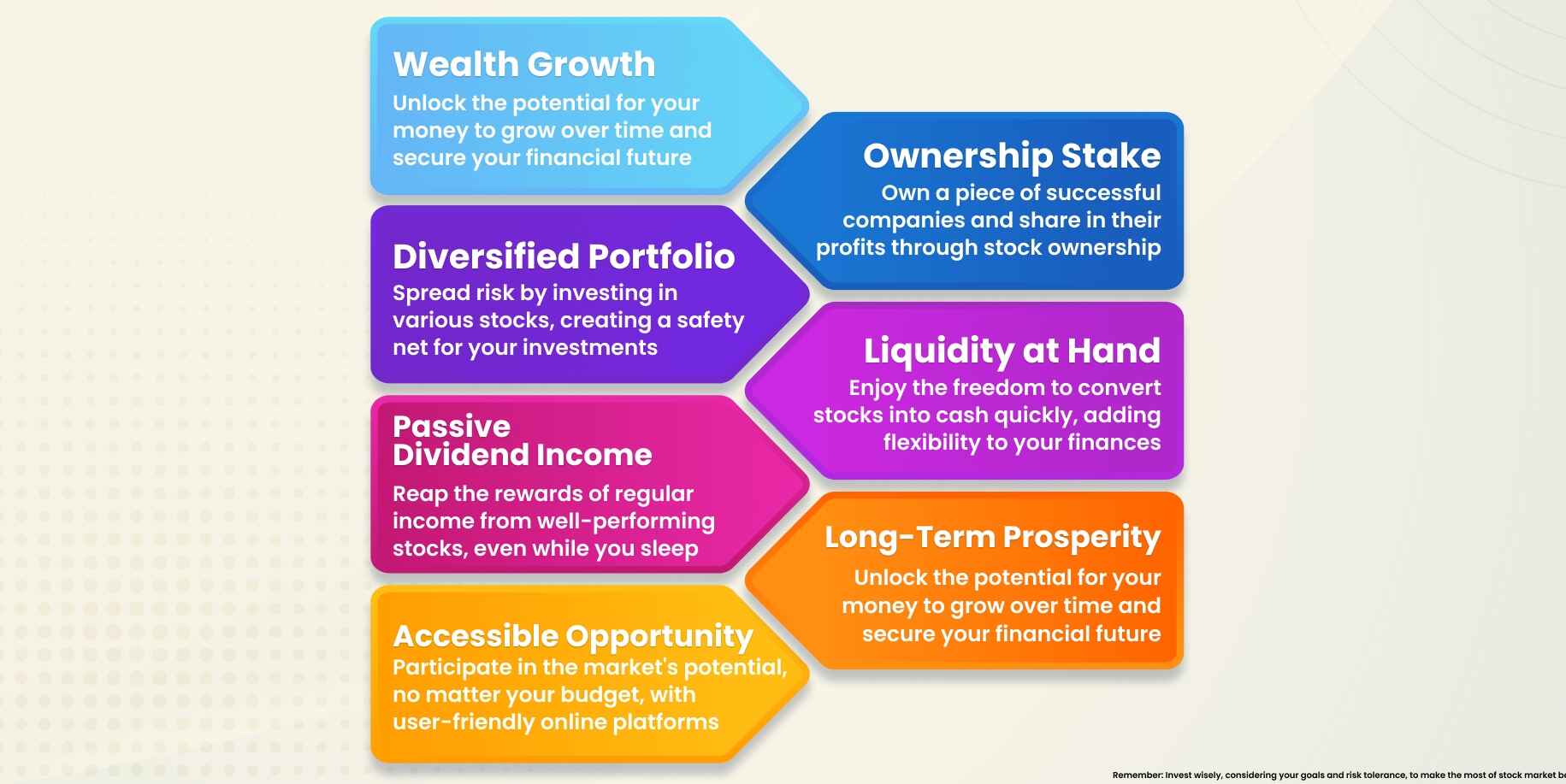
Unlock Wealth Potential with Stock Investments
What are stocks?
Stocks:
Stocks , also known as shares or equities, represent ownership in a company. When individuals buy stocks, they are purchasing a portion of ownership in the company, making them shareholders. Companies issue stocks as a way to raise capital for various purposes, such as expanding operations, investing in research and development, or paying off debt.
Stocks are traded on stock exchanges, where buyers and sellers come together to exchange ownership in companies. The price of a stock is determined by supply and demand in the market, influenced by factors such as the company's financial performance, industry trends, economic conditions, and investor sentiment.
Investing in stocks can offer potential for capital appreciation and dividends, but it also involves risks. Stock prices can be volatile, and the value of investments can fluctuate over time. It's important for investors to conduct thorough research, diversify their portfolios, and consider their risk tolerance and investment goals before investing in stocks.
Overall, stocks play a significant role in the financial markets, providing opportunities for individuals to participate in the growth and success of companies and potentially build wealth over the long term.

What is share market?
Share Market:
The share market, also known as the stock market or equity market, is a platform where buying and selling of securities such as stocks, bonds, and derivatives take place. It serves as a marketplace where investors, traders, and companies come together to trade ownership in companies and other financial instruments.
The primary function of the share market is to facilitate the transfer of capital from investors who have excess funds to companies in need of capital for various purposes, such as expansion, research and development, or debt repayment. Companies raise capital by issuing shares of stock, which represent ownership in the company, to investors in exchange for funds.
The share market operates through stock exchanges, which are organized markets where securities are traded. Examples of prominent stock exchanges include National Stock Exchange (NSE), and Bombay Stock Exchange (BSE). These exchanges provide the infrastructure and regulations necessary for trading securities, ensuring transparency, liquidity, and fair pricing.
Investors participate in the share market with the objective of generating returns on their investments. They may buy and hold stocks for the long term as part of their investment portfolio, or engage in trading activities to capitalize on short-term price movements. The share market is influenced by various factors such as company performance, economic indicators, geopolitical events, and investor sentiment.
Overall, the share market plays a vital role in the global economy by facilitating capital formation, investment opportunities, and wealth creation for individuals and businesses alike.
What are the stock exchanges in india?
Stock Exchanges in India:
India has several stock exchanges where securities such as stocks, bonds, and derivatives are traded. The two primary stock exchanges in India are:
- Bombay Stock Exchange (BSE): Established in 1875, the Bombay Stock Exchange is one of the oldest stock exchanges in Asia. It is located in Mumbai, Maharashtra, and is the first stock exchange in India to obtain permanent recognition from the government under the Securities Contracts Regulation Act, 1956. BSE facilitates trading in equities, derivatives, mutual funds, and debt instruments.
- National Stock Exchange (NSE): Founded in 1992, the National Stock Exchange is the leading stock exchange in India in terms of trading volumes and market capitalization. It is headquartered in Mumbai and operates on an electronic trading platform, providing investors with access to a wide range of financial products such as equities, derivatives, currencies, and debt securities.
In addition to BSE and NSE, India has regional stock exchanges that cater to specific geographical regions or niche markets. However, their significance has diminished over time due to the dominance of BSE and NSE. Some of the notable regional stock exchanges include Calcutta Stock Exchange (CSE), Madras Stock Exchange (MSE), and Ahmedabad Stock Exchange (ASE).
Overall, BSE and NSE are the primary drivers of India's capital markets, providing investors with opportunities to trade and invest in a wide range of securities, contributing to the growth and development of the Indian economy.
How does a share market works?

How Does the Share Market Work?
The share market, also known as the stock market or equity market, operates as a marketplace where buying and selling of securities such as stocks, bonds, and derivatives take place. Here's an overview of how the share market works:
- Issuance of Securities: Companies issue securities such as stocks to raise capital for various purposes, such as expansion, research and development, or debt repayment. These securities represent ownership in the company and are offered to investors in exchange for funds.
- Trading on Stock Exchanges: Securities are traded on stock exchanges, which are organized markets where buyers and sellers come together to exchange ownership in companies and other financial instruments. Examples of stock exchanges include the New York Stock Exchange (NYSE), NASDAQ, and Bombay Stock Exchange (BSE).
- Order Placement: Investors place buy or sell orders for securities through brokerage firms or online trading platforms. They specify the quantity of securities they wish to buy or sell and the price at which they are willing to transact.
- Matching of Orders: Stock exchanges match buy and sell orders based on price and time priority. When a buyer's bid price matches a seller's ask price, a trade is executed, and ownership of the securities is transferred from the seller to the buyer.
- Price Determination: The price of securities is determined by supply and demand in the market. Factors such as company performance, industry trends, economic conditions, and investor sentiment influence stock prices. Higher demand for a stock typically leads to an increase in its price, while lower demand may result in a decrease.
- Market Participants: Various participants, including individual investors, institutional investors, traders, and market makers, contribute to the liquidity and efficiency of the share market. They engage in buying and selling activities to capitalize on price movements and generate returns on their investments.
The share market operates on the principles of transparency, liquidity, and efficiency, providing investors with opportunities to trade and invest in a wide range of securities. It plays a crucial role in capital formation, economic growth, and wealth creation for individuals and businesses alike.
What are the common share market terminologies?
Share Market Terminologies:
- Stock: A stock, also known as a share or equity, represents ownership in a company. When individuals buy stocks, they become shareholders and have a claim on the company's assets and earnings.
- Market Capitalization: Market capitalization, often referred to as market cap, is the total value of a company's outstanding shares of stock. It is calculated by multiplying the company's share price by the number of outstanding shares.
- Dividend: A dividend is a distribution of a portion of a company's earnings to its shareholders. It is typically paid out in cash on a regular basis, such as quarterly or annually, and is often considered a source of income for investors.
- Price-Earnings Ratio (P/E Ratio): The price-earnings ratio is a valuation metric that measures the current market price of a company's stock relative to its earnings per share (EPS). It is calculated by dividing the market price per share by the earnings per share.
- Volatility: Volatility refers to the degree of variation in the price of a stock or the overall market over time. High volatility indicates large price fluctuations, while low volatility suggests more stable prices.
- Bull Market: A bull market is characterized by rising prices and investor optimism. It typically occurs during periods of economic growth and favorable market conditions, leading to increased investor confidence and higher stock prices.
- Bear Market: A bear market is characterized by falling prices and investor pessimism. It typically occurs during periods of economic downturn or recession, leading to decreased investor confidence and lower stock prices.
- Index: An index is a statistical measure of the performance of a group of stocks representing a particular market or sector. Common stock market indices include the S&P 500, Dow Jones Industrial Average (DJIA), and Nifty 50.
- Blue Chip Stocks: Blue chip stocks are shares of large, well-established companies with a history of stable earnings and dividends. They are often considered safe investments and are known for their reliability and stability.
- Day Trading: Day trading involves buying and selling securities within the same trading day, with the goal of profiting from short-term price movements. Day traders typically close out their positions before the market closes to avoid overnight exposure.
These are just a few of the many terms used in the share market. Understanding these terminologies can help investors navigate the complexities of the stock market and make informed investment decisions.

Why do people buy stocks?

People buy stocks for various reasons, and investing in the stock market can serve different objectives and financial goals. Here are some common reasons why individuals choose to invest in stocks:
- Potential for Capital Appreciation: One of the primary reasons people buy stocks is the potential for capital appreciation. Stocks represent ownership in companies, and if the company's value increases over time, the value of the stock may also rise, allowing investors to sell their shares at a profit.
- Dividend Income: Many companies pay dividends to their shareholders as a share of their profits. Investors buy dividend-paying stocks to generate a steady income stream from these dividend payments, which can provide passive income and contribute to their overall investment returns.
- Portfolio Diversification: Investing in stocks allows individuals to diversify their investment portfolios and spread risk across different asset classes. Stocks have historically provided higher returns compared to other investment options over the long term, making them an attractive choice for diversification.
- Participation in Economic Growth: Buying stocks enables investors to participate in the growth and success of the economy and various industries. As companies grow and expand their operations, their stock prices may increase, allowing investors to benefit from economic growth and prosperity.
- Ownership and Control: Owning stocks gives investors a stake in the companies they invest in, allowing them to have a say in company decisions through voting rights at shareholder meetings. This sense of ownership and control can be empowering for investors who want to align their investments with their values and beliefs.
- Inflation Hedge: Stocks have historically provided a hedge against inflation, as the value of companies and their assets tends to increase over time in line with inflationary pressures. Investing in stocks can help investors preserve the purchasing power of their wealth and combat the erosive effects of inflation.
Overall, people buy stocks as part of a comprehensive investment strategy to grow their wealth, generate income, and achieve their financial goals over the long term. While investing in stocks carries risks, it also offers potential rewards and opportunities for wealth accumulation.
What are the features of share market?
Features of the Share Market:
The share market, also known as the stock market or equity market, exhibits several key features that distinguish it as a unique financial marketplace. Understanding these features is essential for investors looking to participate in the share market effectively. Here are some notable features of the share market:
- Liquidity: The share market is characterized by high liquidity, allowing investors to buy and sell securities with ease. Market liquidity ensures that there is a ready market for securities, enabling investors to execute trades quickly and at competitive prices.
- Market Participants: The share market consists of various participants, including individual investors, institutional investors, traders, market makers, and regulatory authorities. Each participant plays a distinct role in the functioning of the market, contributing to its liquidity, efficiency, and transparency.
- Volatility: Volatility is a prominent feature of the share market, with prices of securities fluctuating regularly in response to various factors such as company performance, economic indicators, geopolitical events, and investor sentiment. High volatility presents both opportunities and risks for investors.
- Regulation: The share market operates under strict regulatory oversight to ensure fairness, transparency, and investor protection. Regulatory authorities such as the Securities and Exchange Board of India (SEBI) in India enforce rules and regulations governing market participants, trading practices, and disclosure requirements.
- Market Indices: Market indices serve as benchmarks for measuring the performance of the share market. Indices such as the S&P BSE Sensex and Nifty 50 in India track the movement of select stocks and provide insights into overall market trends and investor sentiment.
- Global Connectivity: The share market is interconnected globally, with investors and traders able to access markets and trade securities across borders. Globalization and advancements in technology have facilitated cross-border investment flows and enhanced market efficiency.
- Price Discovery: The share market serves as a platform for price discovery, where supply and demand dynamics determine the prices of securities. Prices are influenced by factors such as company fundamentals, market sentiment, economic conditions, and geopolitical events.
These features collectively contribute to the dynamic and multifaceted nature of the share market, providing opportunities for investors to participate in wealth creation, capital formation, and economic growth.
Who regulates share market?
Regulatory Body of the Share Market:
The regulatory body responsible for overseeing and regulating the share market in India is the Securities and Exchange Board of India (SEBI). Established in 1988, SEBI is the apex regulatory authority for the securities market in India, tasked with protecting the interests of investors, promoting fair and transparent trading practices, and ensuring the orderly functioning of the market.
SEBI operates under the purview of the Ministry of Finance, Government of India, and has statutory powers to regulate various segments of the securities market, including stock exchanges, brokers, depositories, mutual funds, and listed companies. It formulates regulations, conducts inspections and investigations, imposes penalties for market misconduct, and educates investors about their rights and responsibilities.
SEBI's regulatory framework aims to maintain market integrity, prevent fraud and manipulation, and foster investor confidence in the share market. Through its initiatives and interventions, SEBI plays a crucial role in promoting investor protection, market development, and capital market reforms in India.

Eligibility to invest in share market?
Eligibility for Investing in the Share Market:
Investing in the share market is accessible to individuals who meet certain eligibility criteria and have the necessary resources and knowledge to participate in the market. While there are no specific legal restrictions on who can invest in the share market, here are some general eligibility criteria:
- Age: Individuals must be of legal age to invest in the share market. In most countries, the legal age for investing is 18 years or older. Minors may be able to invest with the assistance of a parent or guardian.
- Financial Resources: Investors should have sufficient financial resources to fund their investment activities in the share market. They should have disposable income available for investment after meeting their essential living expenses and financial obligations.
- Knowledge and Experience: While not a legal requirement, having knowledge and experience in investing is essential for success in the share market. Investors should understand basic financial concepts, investment principles, and the risks associated with investing in stocks and other securities.
- Risk Appetite: Investors should have a clear understanding of their risk tolerance and investment objectives. Investing in the share market involves inherent risks, including the risk of loss of capital. Individuals should be prepared to accept these risks and invest accordingly.
- Access to Investment Platforms: Investors should have access to investment platforms such as brokerage accounts, online trading platforms, or mutual fund distributors to facilitate their investment activities in the share market. They should choose reputable and regulated platforms for trading and investing.
Overall, individuals who meet these eligibility criteria and are willing to commit time, effort, and resources to educate themselves about investing can participate in the share market and potentially benefit from its wealth-building opportunities.
What are advantages and disadvantages of share market investing?

Advantages and Disadvantages of Share Market Investing:
Investing in the share market offers several advantages and disadvantages that investors should consider before making investment decisions. Here's an overview of the pros and cons:
- Potential for High Returns: Investing in the share market can offer the potential for high returns over the long term. Historically, stocks have outperformed other asset classes such as bonds and cash investments, providing investors with opportunities for capital appreciation and wealth accumulation.
- Diversification: The share market allows investors to diversify their investment portfolios across different companies, industries, and asset classes. Diversification helps spread risk and reduces the impact of individual stock performance on overall portfolio returns.
- Dividend Income: Many companies pay dividends to their shareholders as a share of their profits. Investing in dividend-paying stocks can provide investors with a steady income stream, offering a source of passive income and enhancing total returns.
- Liquidity: The share market is highly liquid, allowing investors to buy and sell securities with ease. Investors can convert their investments into cash quickly, enabling them to capitalize on investment opportunities or meet liquidity needs as required.
- Ownership Stake: Buying stocks entitles investors to ownership stakes in the companies they invest in. Shareholders have voting rights and may participate in company decisions through shareholder meetings, giving them a voice in corporate governance matters.
- Market Volatility: The share market is prone to volatility, with stock prices fluctuating regularly in response to various factors such as company performance, economic conditions, and investor sentiment. Volatility can lead to significant price swings and increased investment risk.
- Risk of Loss: Investing in the share market carries inherent risks, including the risk of loss of capital. Stock prices can decline due to adverse market conditions, company-specific issues, or unexpected events, resulting in financial losses for investors.
- Market Uncertainty: The share market is subject to market uncertainty and unpredictable events that can impact investor confidence and sentiment. Uncertainty related to economic trends, geopolitical developments, regulatory changes, or corporate scandals can lead to market downturns and increased volatility.
- Information Overload: The share market is flooded with information, including financial reports, market news, and analyst recommendations. Investors may face challenges in processing and interpreting this information effectively, leading to decision-making biases or analysis paralysis.
- Psychological Factors: Investing in the share market can be emotionally challenging, especially during periods of market turbulence or downturns. Psychological factors such as fear, greed, and herd mentality can influence investor behavior and lead to irrational investment decisions.
Advantages:
Disadvantages:
Overall, while share market investing offers the potential for wealth creation and financial growth, it also entails risks and uncertainties that investors should carefully evaluate and manage to achieve their investment objectives.
Tips to investing in share market
Investing in the share market can be rewarding, but it requires careful planning, research, and discipline to achieve success. Whether you're a beginner or an experienced investor, here are some tips to consider when investing in the share market:
- Set Clear Investment Goals: Define your investment objectives, risk tolerance, and time horizon before investing in the share market. Determine whether you're investing for capital appreciation, dividend income, retirement savings, or other financial goals.
- Do Your Research: Conduct thorough research on the companies you're interested in investing in. Analyze their financial performance, business fundamentals, competitive positioning, and growth prospects. Consider factors such as revenue growth, profitability, debt levels, and industry trends.
- Diversify Your Portfolio: Spread your investments across different companies, industries, and asset classes to reduce risk and minimize the impact of individual stock performance on your portfolio. Diversification helps mitigate volatility and provides downside protection during market downturns.
- Invest for the Long Term: Take a long-term perspective when investing in the share market. Avoid trying to time the market or chase short-term gains. Instead, focus on buying quality companies with strong fundamentals and holding them for the long term to benefit from compounding returns.
- Monitor Your Investments: Regularly review and monitor your investment portfolio to ensure it remains aligned with your investment goals and risk tolerance. Stay informed about market developments, company news, and economic trends that may impact your investments.
- Manage Risk: Implement risk management strategies to protect your capital and minimize losses. Set stop-loss orders to limit downside risk, diversify your investments, and avoid putting all your eggs in one basket. Consider using asset allocation and position sizing techniques to manage portfolio risk effectively.
- Stay Disciplined: Stick to your investment plan and resist the temptation to make impulsive decisions based on short-term market fluctuations or emotional reactions. Avoid herd mentality and base your investment decisions on rational analysis and objective criteria.
By following these tips and adopting a disciplined approach to investing, you can navigate the share market more effectively and increase your chances of achieving your financial goals over the long term.